2021-2022学年人教版英语中考复习之九年级 Units 3、4课件(共64张PPT)
文档属性
| 名称 | 2021-2022学年人教版英语中考复习之九年级 Units 3、4课件(共64张PPT) | 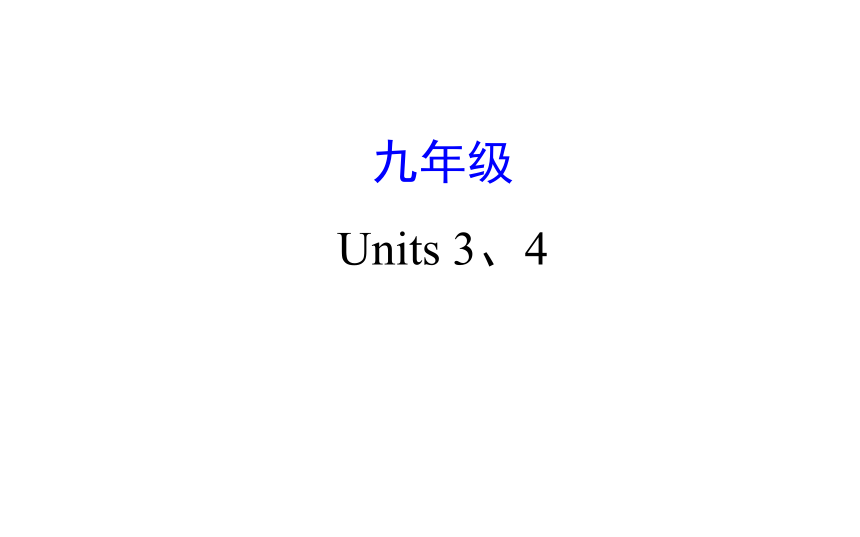 | |
| 格式 | ppt | ||
| 文件大小 | 953.0KB | ||
| 资源类型 | 教案 | ||
| 版本资源 | 人教新目标(Go for it)版 | ||
| 科目 | 英语 | ||
| 更新时间 | 2021-07-28 16:19:26 | ||
图片预览

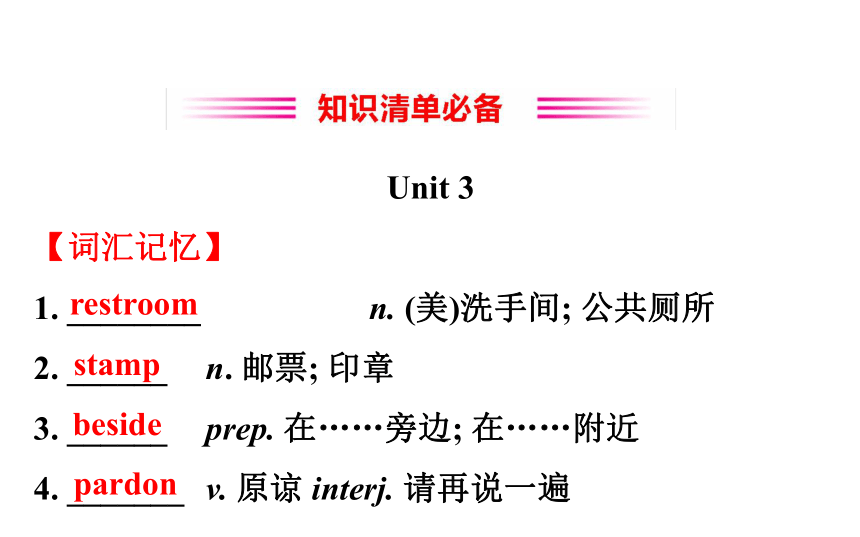
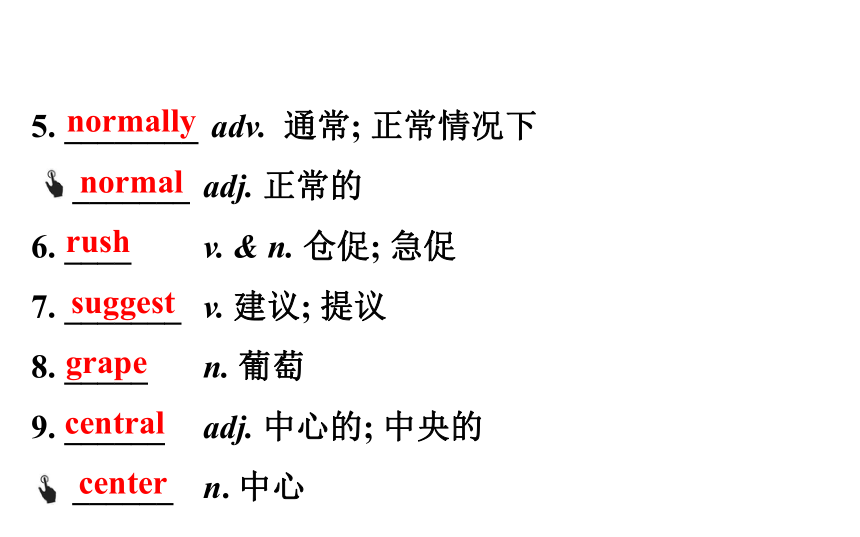
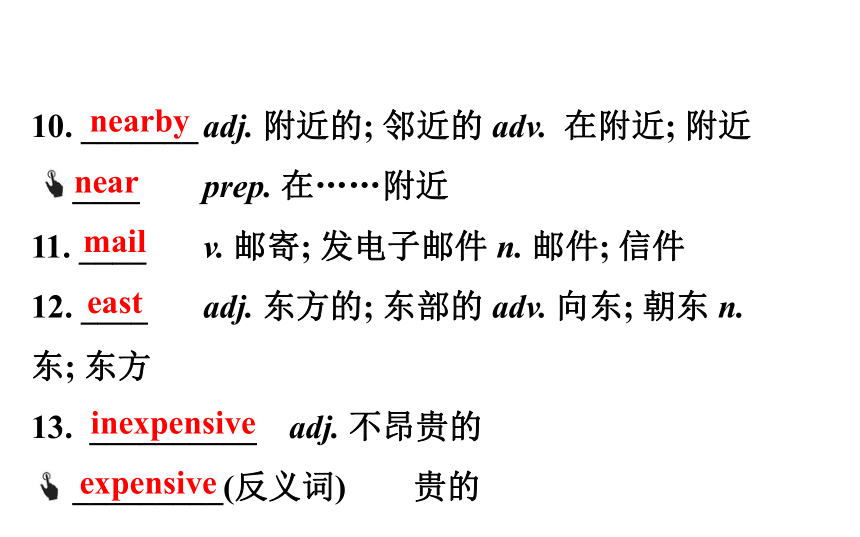
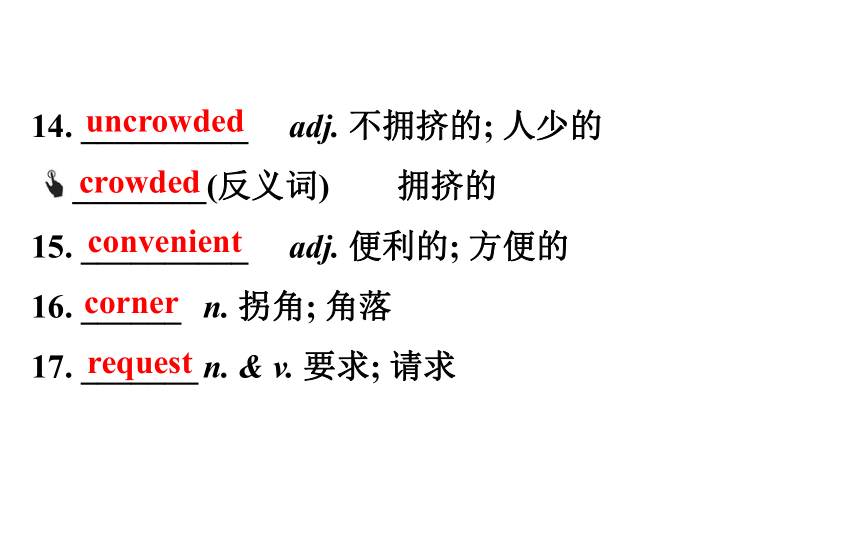
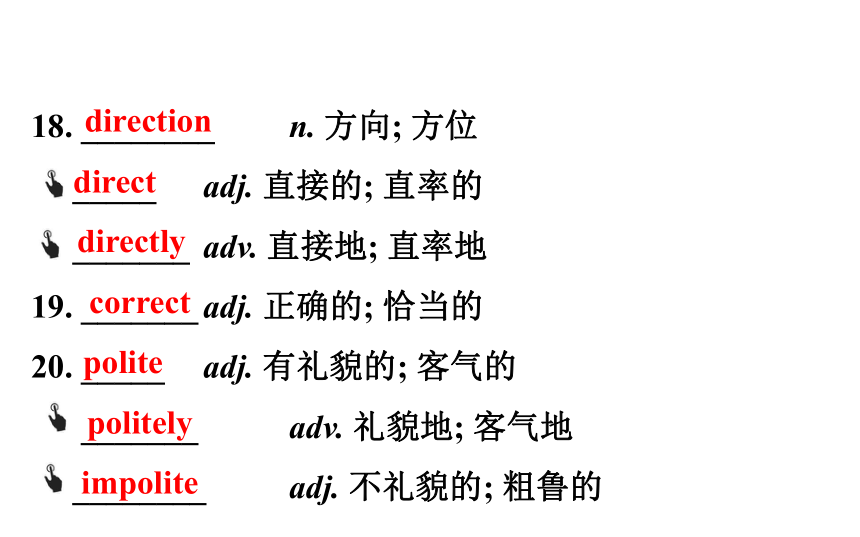
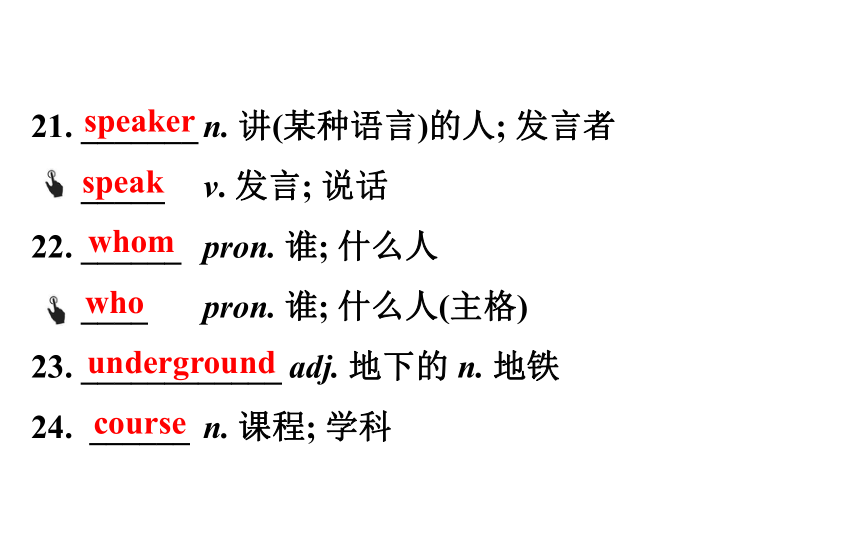
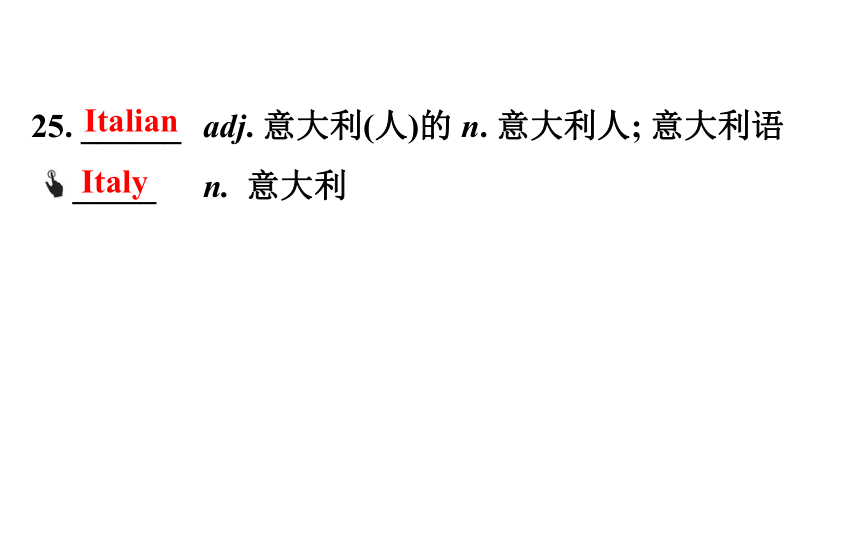
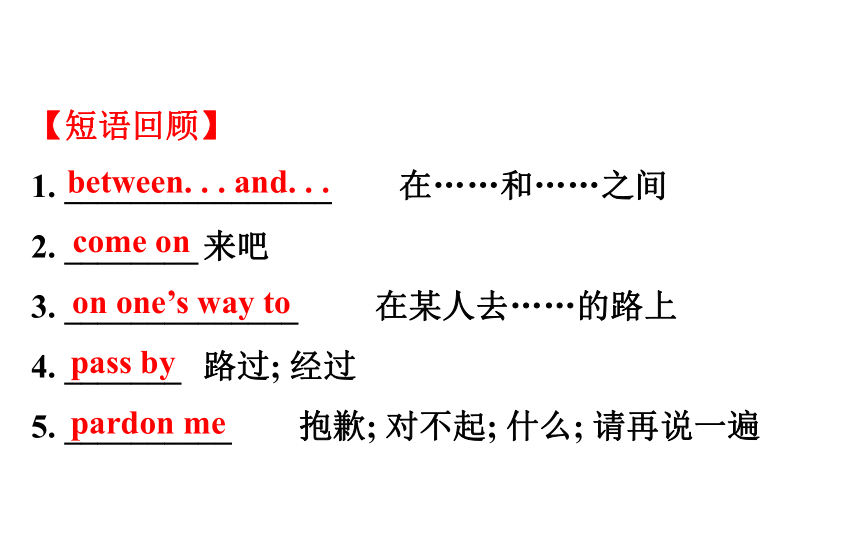
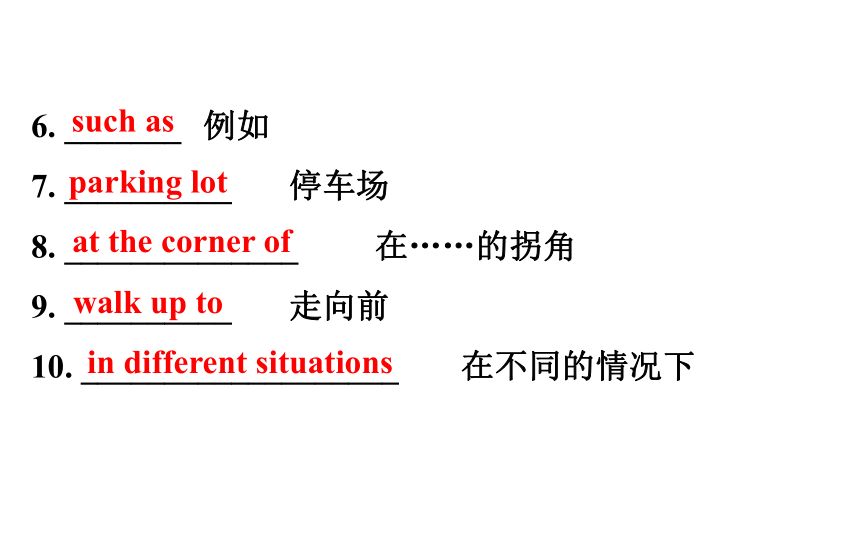
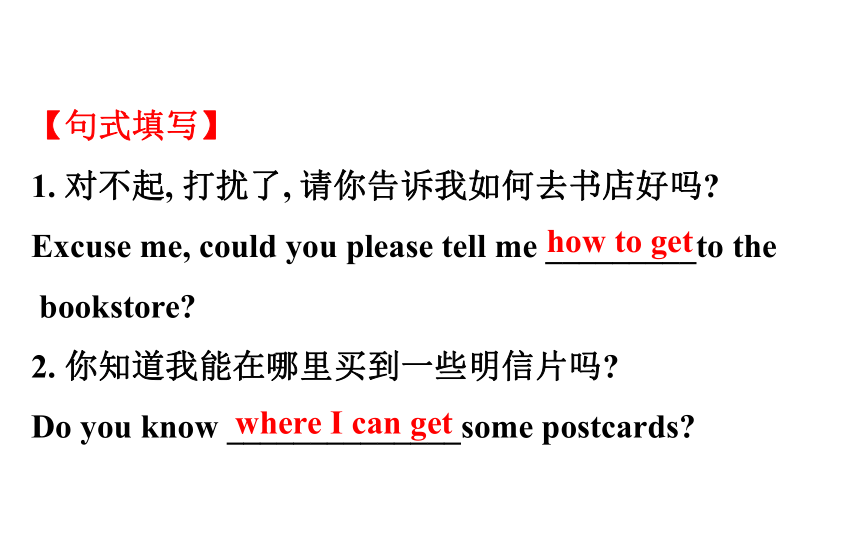
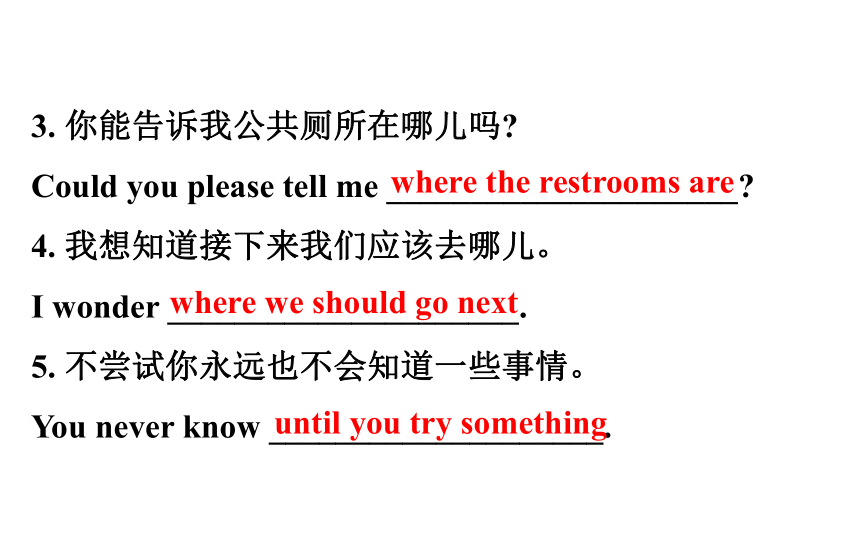
文档简介
九年级
Units 3、4
Unit 3
【词汇记忆】
1. ________ n. (美)洗手间; 公共厕所
2. ______ n. 邮票; 印章
3. ______ prep. 在……旁边; 在……附近
4. _______ v. 原谅 interj. 请再说一遍
restroom
stamp
beside
pardon
5. ________ adv. 通常; 正常情况下
_______? adj. 正常的
6. ____ v. & n. 仓促; 急促
7. _______ v. 建议; 提议
8. _____ n. 葡萄
9. ______ adj. 中心的; 中央的
______ n. 中心
normally
normal
rush
suggest
grape
central
center
10. _______ adj. 附近的; 邻近的 adv. 在附近; 附近
____ prep. 在……附近
11. ____ v. 邮寄; 发电子邮件 n. 邮件; 信件
12. ____? adj. 东方的; 东部的 adv. 向东; 朝东 n.
东; 东方
13. __________ adj. 不昂贵的 ?
_________(反义词) 贵的?
nearby
near
mail
east
inexpensive
expensive
14. __________ adj. 不拥挤的; 人少的
________(反义词) 拥挤的
15. __________ adj. 便利的; 方便的
16. ______ n. 拐角; 角落
17. _______ n. & v. 要求; 请求
uncrowded
crowded
convenient
corner
request
18. ________? n. 方向; 方位
_____ adj. 直接的; 直率的
_______ adv. 直接地; 直率地
19. _______ adj. 正确的; 恰当的
20. _____ adj. 有礼貌的; 客气的
_______? adv. 礼貌地; 客气地
________ adj. 不礼貌的; 粗鲁的
direction
direct
directly
correct
polite
politely
impolite
21. _______ n. 讲(某种语言)的人; 发言者
_____ v. 发言; 说话
22. ______ pron. 谁; 什么人
____ pron. 谁; 什么人(主格)
23. ____________ adj. 地下的 n. 地铁
24. ______ n. 课程; 学科?
speaker
speak
whom
who
underground
course
25. ______ adj. 意大利(人)的 n. 意大利人; 意大利语
_____ n. 意大利
Italian
Italy
【短语回顾】
1. ________________ 在……和……之间
2. ________ 来吧?
3. ______________ 在某人去……的路上?
4. _______ 路过; 经过?
5. __________ 抱歉; 对不起; 什么; 请再说一遍 ?
between. . . and. . .
come on
on one’s way to
pass by
pardon me
6. _______ 例如?
7. __________ 停车场?
8. ______________ 在……的拐角?
9. __________ 走向前?
10. ___________________ 在不同的情况下?
such as
parking lot
at the corner of
walk up to
in different situations
【句式填写】
1. 对不起, 打扰了, 请你告诉我如何去书店好吗?
Excuse me, could you please tell me _________to the
bookstore? ?
2. 你知道我能在哪里买到一些明信片吗?
Do you know ______________some postcards? ?
how to get
where I can get
3. 你能告诉我公共厕所在哪儿吗?
Could you please tell me _____________________? ?
4. 我想知道接下来我们应该去哪儿。
I wonder _____________________. ?
5. 不尝试你永远也不会知道一些事情。
You never know ____________________. ?
where the restrooms are
where we should go next
until you try something
6. 对不起, 你知道附近是否有一家餐馆吗?
Pardon me, do you know ________a restaurant
around here? ?
7. 仅仅正确地问问题是不够的。
________________just ask a question correctly. ?
if there is
It is not enough to
Unit 4
【词汇记忆】
1. _________ adj. 有幽默感的; 滑稽有趣的
______ n. 幽默
2. _____ adj. 不说话的; 沉默的
______? n. 沉默
3. _______ adj. 有用的; 有帮助的
humorous
humor
silent
silence
helpful
4. _____ n. & v. 得分; 进球
5. ___________ n. 背景
6. ________ v. 采访; 面试 n. 面试; 访谈
7. _____ adj. 亚洲(人)的 n. 亚洲人
____? n. 亚洲
score
background
interview
Asian
Asia
8. ____ v. 对付; 对待
__________(过去式/过去分词)
9. _______ n. 害羞; 腼腆
___ adj. 羞怯的; 腼腆的
10. ____ v. 敢于; 胆敢
11. ______ n. 人群; 观众
________ adj. 拥挤的
deal
dealt/dealt
shyness
shy
dare
crowd
crowded
12. ___ n. 吨; (pl. )大量; 许多
13. _______ adj. 私人的; 私密的
14. ______ n. 警卫; 看守 v. 守卫; 保卫
15. _______ v. 需要; 要求?
16. _________ adj. 欧洲(人)的 n. 欧洲人
_______ n. 欧洲
ton
private
guard
require
European
Europe
17. _______ adj. 非洲(人)的n. 非洲人
______ n. 非洲
18. ______ adj. 英国(人)的 ?
_______? n. 英国
19. ______ n. 讲话; 发言?
20. ______ n. 民众 adj. 公开的; 公众的?
21. _______ adv. 不常; 很少
African
Africa
British
Britain
speech
public
seldom
22. ________ v. & n. 影响
23. ______ adj. 缺席; 不在?
24. ___ v. 不及格; 失败; 未能(做到)
______? n. 失败
25. ___________ n. 考试; 审查
________ v. 考试
influence
absent
fail
failure
examination
examine
26. ______ adv. 确切地; 精确地
_____? adj. 确切的
27. ______ adj. 自豪的; 骄傲的
_____ n. 骄傲
exactly
exact
proud
pride
【短语回顾】
1. _______________ 时常; 有时?
2. _______ 开始从事?
3. ________ 应对; 处理?
4. ________ 闲逛?
5. _____________? 缺席; 不在?
from time to time
take up
deal with
hang out
be absent from
6. ____________ 做演讲?
7. ________ 公开地?
8. ________ 亲自?
9. ___________ 为……感到自豪?
10. __________ 为……骄傲; 感到自豪?
give a speech
in public
in person
take pride in
be proud of
【句式填写】
1. 你过去很矮, 是吗?
You ______________, ______you? ?
2. ——马里奥过去矮吗?
——是的。
—____Mario ________short? ?
—Yes, he ___.
used to be short
didn’t
Did
use to be
did
3. 自从上次见到我们的小学同学, 时间已经过去三年
了。
________three years _____we last ____our primary
school classmates. ?
4. 但是现在无论我去哪儿, 都会有很多人关注我。
But now I get ______________everywhere I go. ?
It’s been
since
saw
tons of attention
5. 但是看看他现在是多么高大强壮呀!
But look _____________________now! ?
6. 那正是我所需要的。
It was exactly _____________. ?
7. 过去的几年里我的生活发生了很大的变化。
My life _______________in the last few years. ?
how big and strong he is
what I needed
has changed a lot
8. 就在那时我决定改变。
___________I decided to change. ?
That’s when
1. I suggest Water City Restaurant in Water World. 我建议去水上世界的水城餐馆。(Unit 3, P19)
? suggest v. 建议; 提议
【测考点】
( )(1)(2018·咸宁中考)—Could you give me a few
_________on how to spend the coming summer
holiday? ?
—OK, let me see.
A. hobbies B. suggestions
C. knowledge D. information
B
( )(2)We talked about the problem and Tim
_________doing some research first. 世纪金榜导
学号?
A. finished B. enjoyed
C. suggested D. practiced
C
【巧归纳】
suggest为动词, 意为“建议; 提议”, 其用法如下:
【拓展】
suggestion是可数名词, 意为“建议; 意见”, 复数形式为suggestions。
2. Both are correct, but the first one sounds less polite.
这两种(表达方式)都是正确的, 但是第一种听起来更不礼貌。(Unit 3, P22)
?polite adj. 有礼貌的
【测考点】
(1)“You said there was something you wanted to ask
me, ” he said _______(polite).
(2)It’s ________(polite) to stare at anyone or to talk
loudly in public.
(3)你应该礼貌对待老人。
You should ___ _____ __the old.
politely
impolite
be
polite
to
【巧归纳】
polite形容词, 意为“有礼貌的; 客气的”, 常用短语be polite to sb. , 意为“对某人有礼貌”。
【助记】与polite有关的词汇:
3. You really require a lot of talent and hard work to succeed. ?
你真的需要很多才能和努力工作才能成功。(Unit 4, P27)
?require v. 需要; 要求
【测考点】
(1)用括号中动词的适当形式填空。
① Learning a foreign language well requires _______
(read) often.
②All the fans required him _________(appear) again. ?
reading
to appear
(2)根据汉语提示完成句子, 每空词数不限。
①这确实需要一些时间和耐心。
This really ____________________________. ?
②有些事很可能要求你进行较大的改变。
Some things might ___________________a lot. ?
requires some time and patience
require you to change
③(2018·襄阳中考)夏天到了, 应该要求岸边所有救生人
员齐心协力防止孩子们独自下河游泳。(require)
.
Summer is coming. All the lifeguards on the bank
should _______________________________________
_______________________________in the river. ?
be required to work together to prevent/stop
kids/children from swimming alone
【巧归纳】
These pets require a lot of care.
这些宠物需要悉心照顾。
At the beginning of the new term, all the students are required to take a short test.
新学期开始, 所有学生都要参加一次小测试。
The baby requires looking after.
这个婴儿需要被照顾。
The situation requires that I should be there.
情况需要我在那里。
4. When he was a little boy, he seldom caused any problems. 当他是小孩子时, 他很少惹麻烦。(Unit 4, P30)
?seldom adv. 不常; 很少
【测考点】
(1)(2019·宁波中考) We _______(很少地) hang out at
weekends recently.
seldom
( ) (2)(2018·徐州中考) —Would you like some
coffee?
— No, thanks. I _________drink coffee. ?
A. seldom B. often
C. only D. always
A
( )(3)Jim seldom eats junk food, _________? ?
A. does he B. doesn’t he
C. will he D. won’t he
A
【巧归纳】
seldom为表示频率的副词, 意思是“很少; 不常”, 反义词是often。其主要用法如下:
(1)seldom通常放在实义动词之前, be动词、情态动词及助动词等之后。
(2)seldom表示不完全否定, 含有否定的意义, 在反意疑问句中, 疑问部分要用肯定式。
【拓展】
频度副词按照频率高低排列如下: always>usually>often>sometimes>seldom(很少)>
hardly ever>never(从不)
5. They take pride in everything good that I do. 他们对我所做的每一件好事情都感到自豪。(Unit 4, P30)
? pride n. 自豪; 骄傲
【测考点】
( ) (1)As we all know, Wudang Mountain is the
_________of Shiyan. ?
A. product B. pride C. progress D. purpose
B
( )(2)We take _________pride in his achievements
and wish him to make more progress.
.?
A. a B. an
C. the D. /
(3)We were ______(pride) that we won first prize in the
game.
D
proud
(4)He is the pride of his family. (改为同义句)
His family ______________. ?
(5)As a Chinese, I feel proud. (改为同义句)
I ____________________________a Chinese. ?
is proud of him
am proud of/take pride in being
【辨不同】“自豪”的两种表达
pride
(1)名词, 意为“自豪; 骄傲”, the pride of “……的骄傲/自豪”
(2)短语take pride in“为……感到自
豪”
proud
(1)形容词, 意为“自豪的; 骄傲的”
(2)短语be proud of “为……骄傲; 为……感到自豪”
They take great pride in their daughter who is now a famous scientist.
他们为现在成为著名科学家的女儿感到自豪。
I know my parents love me and they’re always proud of me.
我知道我的父母爱我, 他们总是为我感到骄傲。
语法点一 宾语从句
→见语法精讲强化篇P215
考点: 由特殊疑问句变为宾语从句时, 关联词就是特殊疑问句中的疑问词
【即时冲关】
Ⅰ. 用适当的关联词补全句子
1. —Could you tell me ____is going to give the speech
at the meeting?
—Mr Chen, our headmaster.
2. Lily used to be very fat and short. These photos can
show you _____she looked like 10 years ago.
who
what
3. I’m lost now and I really don’t know ______I am now.
4. —Excuse me. Can you tell me ____I can get to your
house?
—Take No. 101 bus and it will take you right in front
of my neighborhood.
where
how
5. —Could you tell me _____we’ll have the party?
—Sure. We’ll have it on Sunday evening.
when
Ⅱ. 把下列句子合并为(含宾语从句的)复合句
1. I don’t know. Whom is he speaking to?
________________________________. ?
2. Where is he from? I want to know.
____________________________. ?
I don’t know whom he is speaking to
I want to know where he is from
3. What do you usually do on weekends? Could you
tell me?
____________________________________________? ?
4. Where can I buy some stamps? I wonder.
__________________________________. ?
Could you tell me what you usually do on weekends
I wonder where I can buy some stamps
5. Why is he always late for class? Do you know?
______________________________________? 世纪金
榜导学号?
Do you know why he is always late for class
语法点二 used to 的用法
考点1: used to后跟动词原形, 表示过去常做某事或存在的状态
考点2: used to的否定句、疑问句的构成
【即时冲关】
按要求完成句子
1. He used to drink tea. (改为否定句)
He _________to drink tea. ?
2. They used to live in the big city. (改为一般疑问句)
____they ___to live in the big city?
didn’t use
Did
use
3. Her father used to drink a lot. (改为反意疑问句)
Her father used to drink a lot, ________? ?
4. Lucy used to have long hair. (对画线部分提问)?
What ___Lucy ___to look like? ?
didn’t he
did
use
Units 3、4
Unit 3
【词汇记忆】
1. ________ n. (美)洗手间; 公共厕所
2. ______ n. 邮票; 印章
3. ______ prep. 在……旁边; 在……附近
4. _______ v. 原谅 interj. 请再说一遍
restroom
stamp
beside
pardon
5. ________ adv. 通常; 正常情况下
_______? adj. 正常的
6. ____ v. & n. 仓促; 急促
7. _______ v. 建议; 提议
8. _____ n. 葡萄
9. ______ adj. 中心的; 中央的
______ n. 中心
normally
normal
rush
suggest
grape
central
center
10. _______ adj. 附近的; 邻近的 adv. 在附近; 附近
____ prep. 在……附近
11. ____ v. 邮寄; 发电子邮件 n. 邮件; 信件
12. ____? adj. 东方的; 东部的 adv. 向东; 朝东 n.
东; 东方
13. __________ adj. 不昂贵的 ?
_________(反义词) 贵的?
nearby
near
east
inexpensive
expensive
14. __________ adj. 不拥挤的; 人少的
________(反义词) 拥挤的
15. __________ adj. 便利的; 方便的
16. ______ n. 拐角; 角落
17. _______ n. & v. 要求; 请求
uncrowded
crowded
convenient
corner
request
18. ________? n. 方向; 方位
_____ adj. 直接的; 直率的
_______ adv. 直接地; 直率地
19. _______ adj. 正确的; 恰当的
20. _____ adj. 有礼貌的; 客气的
_______? adv. 礼貌地; 客气地
________ adj. 不礼貌的; 粗鲁的
direction
direct
directly
correct
polite
politely
impolite
21. _______ n. 讲(某种语言)的人; 发言者
_____ v. 发言; 说话
22. ______ pron. 谁; 什么人
____ pron. 谁; 什么人(主格)
23. ____________ adj. 地下的 n. 地铁
24. ______ n. 课程; 学科?
speaker
speak
whom
who
underground
course
25. ______ adj. 意大利(人)的 n. 意大利人; 意大利语
_____ n. 意大利
Italian
Italy
【短语回顾】
1. ________________ 在……和……之间
2. ________ 来吧?
3. ______________ 在某人去……的路上?
4. _______ 路过; 经过?
5. __________ 抱歉; 对不起; 什么; 请再说一遍 ?
between. . . and. . .
come on
on one’s way to
pass by
pardon me
6. _______ 例如?
7. __________ 停车场?
8. ______________ 在……的拐角?
9. __________ 走向前?
10. ___________________ 在不同的情况下?
such as
parking lot
at the corner of
walk up to
in different situations
【句式填写】
1. 对不起, 打扰了, 请你告诉我如何去书店好吗?
Excuse me, could you please tell me _________to the
bookstore? ?
2. 你知道我能在哪里买到一些明信片吗?
Do you know ______________some postcards? ?
how to get
where I can get
3. 你能告诉我公共厕所在哪儿吗?
Could you please tell me _____________________? ?
4. 我想知道接下来我们应该去哪儿。
I wonder _____________________. ?
5. 不尝试你永远也不会知道一些事情。
You never know ____________________. ?
where the restrooms are
where we should go next
until you try something
6. 对不起, 你知道附近是否有一家餐馆吗?
Pardon me, do you know ________a restaurant
around here? ?
7. 仅仅正确地问问题是不够的。
________________just ask a question correctly. ?
if there is
It is not enough to
Unit 4
【词汇记忆】
1. _________ adj. 有幽默感的; 滑稽有趣的
______ n. 幽默
2. _____ adj. 不说话的; 沉默的
______? n. 沉默
3. _______ adj. 有用的; 有帮助的
humorous
humor
silent
silence
helpful
4. _____ n. & v. 得分; 进球
5. ___________ n. 背景
6. ________ v. 采访; 面试 n. 面试; 访谈
7. _____ adj. 亚洲(人)的 n. 亚洲人
____? n. 亚洲
score
background
interview
Asian
Asia
8. ____ v. 对付; 对待
__________(过去式/过去分词)
9. _______ n. 害羞; 腼腆
___ adj. 羞怯的; 腼腆的
10. ____ v. 敢于; 胆敢
11. ______ n. 人群; 观众
________ adj. 拥挤的
deal
dealt/dealt
shyness
shy
dare
crowd
crowded
12. ___ n. 吨; (pl. )大量; 许多
13. _______ adj. 私人的; 私密的
14. ______ n. 警卫; 看守 v. 守卫; 保卫
15. _______ v. 需要; 要求?
16. _________ adj. 欧洲(人)的 n. 欧洲人
_______ n. 欧洲
ton
private
guard
require
European
Europe
17. _______ adj. 非洲(人)的n. 非洲人
______ n. 非洲
18. ______ adj. 英国(人)的 ?
_______? n. 英国
19. ______ n. 讲话; 发言?
20. ______ n. 民众 adj. 公开的; 公众的?
21. _______ adv. 不常; 很少
African
Africa
British
Britain
speech
public
seldom
22. ________ v. & n. 影响
23. ______ adj. 缺席; 不在?
24. ___ v. 不及格; 失败; 未能(做到)
______? n. 失败
25. ___________ n. 考试; 审查
________ v. 考试
influence
absent
fail
failure
examination
examine
26. ______ adv. 确切地; 精确地
_____? adj. 确切的
27. ______ adj. 自豪的; 骄傲的
_____ n. 骄傲
exactly
exact
proud
pride
【短语回顾】
1. _______________ 时常; 有时?
2. _______ 开始从事?
3. ________ 应对; 处理?
4. ________ 闲逛?
5. _____________? 缺席; 不在?
from time to time
take up
deal with
hang out
be absent from
6. ____________ 做演讲?
7. ________ 公开地?
8. ________ 亲自?
9. ___________ 为……感到自豪?
10. __________ 为……骄傲; 感到自豪?
give a speech
in public
in person
take pride in
be proud of
【句式填写】
1. 你过去很矮, 是吗?
You ______________, ______you? ?
2. ——马里奥过去矮吗?
——是的。
—____Mario ________short? ?
—Yes, he ___.
used to be short
didn’t
Did
use to be
did
3. 自从上次见到我们的小学同学, 时间已经过去三年
了。
________three years _____we last ____our primary
school classmates. ?
4. 但是现在无论我去哪儿, 都会有很多人关注我。
But now I get ______________everywhere I go. ?
It’s been
since
saw
tons of attention
5. 但是看看他现在是多么高大强壮呀!
But look _____________________now! ?
6. 那正是我所需要的。
It was exactly _____________. ?
7. 过去的几年里我的生活发生了很大的变化。
My life _______________in the last few years. ?
how big and strong he is
what I needed
has changed a lot
8. 就在那时我决定改变。
___________I decided to change. ?
That’s when
1. I suggest Water City Restaurant in Water World. 我建议去水上世界的水城餐馆。(Unit 3, P19)
? suggest v. 建议; 提议
【测考点】
( )(1)(2018·咸宁中考)—Could you give me a few
_________on how to spend the coming summer
holiday? ?
—OK, let me see.
A. hobbies B. suggestions
C. knowledge D. information
B
( )(2)We talked about the problem and Tim
_________doing some research first. 世纪金榜导
学号?
A. finished B. enjoyed
C. suggested D. practiced
C
【巧归纳】
suggest为动词, 意为“建议; 提议”, 其用法如下:
【拓展】
suggestion是可数名词, 意为“建议; 意见”, 复数形式为suggestions。
2. Both are correct, but the first one sounds less polite.
这两种(表达方式)都是正确的, 但是第一种听起来更不礼貌。(Unit 3, P22)
?polite adj. 有礼貌的
【测考点】
(1)“You said there was something you wanted to ask
me, ” he said _______(polite).
(2)It’s ________(polite) to stare at anyone or to talk
loudly in public.
(3)你应该礼貌对待老人。
You should ___ _____ __the old.
politely
impolite
be
polite
to
【巧归纳】
polite形容词, 意为“有礼貌的; 客气的”, 常用短语be polite to sb. , 意为“对某人有礼貌”。
【助记】与polite有关的词汇:
3. You really require a lot of talent and hard work to succeed. ?
你真的需要很多才能和努力工作才能成功。(Unit 4, P27)
?require v. 需要; 要求
【测考点】
(1)用括号中动词的适当形式填空。
① Learning a foreign language well requires _______
(read) often.
②All the fans required him _________(appear) again. ?
reading
to appear
(2)根据汉语提示完成句子, 每空词数不限。
①这确实需要一些时间和耐心。
This really ____________________________. ?
②有些事很可能要求你进行较大的改变。
Some things might ___________________a lot. ?
requires some time and patience
require you to change
③(2018·襄阳中考)夏天到了, 应该要求岸边所有救生人
员齐心协力防止孩子们独自下河游泳。(require)
.
Summer is coming. All the lifeguards on the bank
should _______________________________________
_______________________________in the river. ?
be required to work together to prevent/stop
kids/children from swimming alone
【巧归纳】
These pets require a lot of care.
这些宠物需要悉心照顾。
At the beginning of the new term, all the students are required to take a short test.
新学期开始, 所有学生都要参加一次小测试。
The baby requires looking after.
这个婴儿需要被照顾。
The situation requires that I should be there.
情况需要我在那里。
4. When he was a little boy, he seldom caused any problems. 当他是小孩子时, 他很少惹麻烦。(Unit 4, P30)
?seldom adv. 不常; 很少
【测考点】
(1)(2019·宁波中考) We _______(很少地) hang out at
weekends recently.
seldom
( ) (2)(2018·徐州中考) —Would you like some
coffee?
— No, thanks. I _________drink coffee. ?
A. seldom B. often
C. only D. always
A
( )(3)Jim seldom eats junk food, _________? ?
A. does he B. doesn’t he
C. will he D. won’t he
A
【巧归纳】
seldom为表示频率的副词, 意思是“很少; 不常”, 反义词是often。其主要用法如下:
(1)seldom通常放在实义动词之前, be动词、情态动词及助动词等之后。
(2)seldom表示不完全否定, 含有否定的意义, 在反意疑问句中, 疑问部分要用肯定式。
【拓展】
频度副词按照频率高低排列如下: always>usually>often>sometimes>seldom(很少)>
hardly ever>never(从不)
5. They take pride in everything good that I do. 他们对我所做的每一件好事情都感到自豪。(Unit 4, P30)
? pride n. 自豪; 骄傲
【测考点】
( ) (1)As we all know, Wudang Mountain is the
_________of Shiyan. ?
A. product B. pride C. progress D. purpose
B
( )(2)We take _________pride in his achievements
and wish him to make more progress.
.?
A. a B. an
C. the D. /
(3)We were ______(pride) that we won first prize in the
game.
D
proud
(4)He is the pride of his family. (改为同义句)
His family ______________. ?
(5)As a Chinese, I feel proud. (改为同义句)
I ____________________________a Chinese. ?
is proud of him
am proud of/take pride in being
【辨不同】“自豪”的两种表达
pride
(1)名词, 意为“自豪; 骄傲”, the pride of “……的骄傲/自豪”
(2)短语take pride in“为……感到自
豪”
proud
(1)形容词, 意为“自豪的; 骄傲的”
(2)短语be proud of “为……骄傲; 为……感到自豪”
They take great pride in their daughter who is now a famous scientist.
他们为现在成为著名科学家的女儿感到自豪。
I know my parents love me and they’re always proud of me.
我知道我的父母爱我, 他们总是为我感到骄傲。
语法点一 宾语从句
→见语法精讲强化篇P215
考点: 由特殊疑问句变为宾语从句时, 关联词就是特殊疑问句中的疑问词
【即时冲关】
Ⅰ. 用适当的关联词补全句子
1. —Could you tell me ____is going to give the speech
at the meeting?
—Mr Chen, our headmaster.
2. Lily used to be very fat and short. These photos can
show you _____she looked like 10 years ago.
who
what
3. I’m lost now and I really don’t know ______I am now.
4. —Excuse me. Can you tell me ____I can get to your
house?
—Take No. 101 bus and it will take you right in front
of my neighborhood.
where
how
5. —Could you tell me _____we’ll have the party?
—Sure. We’ll have it on Sunday evening.
when
Ⅱ. 把下列句子合并为(含宾语从句的)复合句
1. I don’t know. Whom is he speaking to?
________________________________. ?
2. Where is he from? I want to know.
____________________________. ?
I don’t know whom he is speaking to
I want to know where he is from
3. What do you usually do on weekends? Could you
tell me?
____________________________________________? ?
4. Where can I buy some stamps? I wonder.
__________________________________. ?
Could you tell me what you usually do on weekends
I wonder where I can buy some stamps
5. Why is he always late for class? Do you know?
______________________________________? 世纪金
榜导学号?
Do you know why he is always late for class
语法点二 used to 的用法
考点1: used to后跟动词原形, 表示过去常做某事或存在的状态
考点2: used to的否定句、疑问句的构成
【即时冲关】
按要求完成句子
1. He used to drink tea. (改为否定句)
He _________to drink tea. ?
2. They used to live in the big city. (改为一般疑问句)
____they ___to live in the big city?
didn’t use
Did
use
3. Her father used to drink a lot. (改为反意疑问句)
Her father used to drink a lot, ________? ?
4. Lucy used to have long hair. (对画线部分提问)?
What ___Lucy ___to look like? ?
didn’t he
did
use
